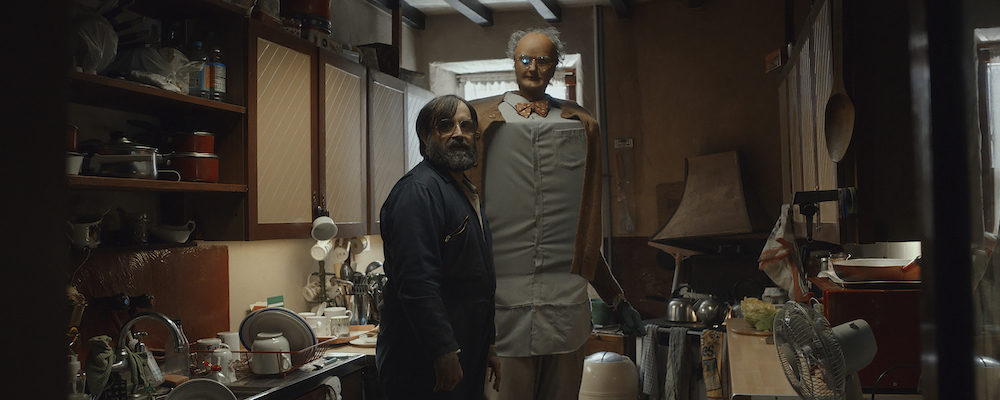‘Brian and Charles’ Is as Delightfully Quirky as the Robot at Its Center
Tony Sokol
“Can birds do what they like?” robot Charles Petrescu (Chris Hayward) asks his friend, housemate and creator, Brian Gittins (David Earl), at the midway point of “Brian and Charles.” Written by Earl and Hayward, and directed by Jim Archer, the film is ultimately about freedom, and how it can be as manufactured as loneliness. Brian likes to make things, and he likes the things he makes. It is so simple the audience can’t help but like them, and him, too. But not as much as the robot.
The premise is delightfully absurdist, without a touch of surrealism, and as sweet a comedy as a children’s film. This is because the actors are in many ways just grown children, playing silly games in character. Brian is Earl’s stage name, and he’s put in appearances in his friend Ricky Gervais’ Netflix series, “After Life.” He is playing the sad sack everyman at the heart of most of the projects that the crowd throws together. There is no judgment, no ridicule, except from the villain, town bully Eddie Tommington (Jamie Michie), and simplicity is a virtue.
Except Brian is really not a simple character, he talks to cameramen, even though we don’t know if they’re really following him around. The film drops the mockumentary approach intermittently after establishing it. He is also the opposite of the mad scientist. Brian is the most affable inventor a technological freak of nature could ever want. His inventions are truly inventive. They come from his imagination and have no precedent. They also usually serve no true utilitarian purpose. It’s hard to set your watch to a flying cuckoo clock.
Earl and Hayward composed fully rounded counterparts to fit in square holes. Brian’s genius is in his improvisation. His inventions come from things he finds on the side of the road. His masterpiece, Charles Petrescu, has an old washing machine for a body, a mannequin’s head, and a gleaming blue eye which has no off-switch. This doesn’t make it an Ex Machina, though. The most dangerous thing this “very cheeky robot” does is insist on sitting in the front seat. Hayward delivers the lines in a frightfully funny, flat pattern, which is positively hysterical when it gets caught in a loop.
Charles is seven feet tall, teaches himself English by reading an encyclopedia, and loves cabbage. He yearns for Honolulu, but Brian is afraid to let him move past his property. He never says why, but Brian is secretive to the point of low-key mania about his talking machine. Part of this comes from a deep loneliness, the rest is from real concern, bordering on parental worry. Charles wants adventures and excitement. He wants to do what the birds do, and Brian couldn’t even quite get an air jalopy aloft. So, when Brian ultimately gifts his creation with the world, it is a transcendent moment. Just like the clumsy slapstick adds a recognizable mundaneness to the sight gags, the tenderness is made all the more moving by the embarrassed performances.
“Brian and Charles” is a feature-length adaptation of Earl, Hayward and Archer’s 2017 short film of the same name, but just as sweet. Brian and Charles are best friends forever. Hazel (Louise Brealey), the most innocent love interest to grace film in a long time, not only appreciates the improbable genius of the inventor, but the desperate need at the heart of their friendship. She is openly kind-hearted, with real bravery. Hazel is as helpless against bullying as Brian is, and accepts his ineffectual defense as an excuse to make the most endearing offense. She kisses him first, so very timidly, and his understated reaction brims with the simple joy.
The villain is no real threat, just an overgrown brat, who spoils his own kids with the humiliation of the world at large, and placates the town with bonfires of stolen trinkets. He has no power. He’s not even much stronger than the other people in the sedate Welsh village, only meaner. There is no bloodshed, and shouldn’t be. This isn’t that kind of movie, and it would push against the sweet silliness which makes “Brian and Charles” so effective as a late bloomers’ coming-of-age film. Even a bloody nose would be awkward. But Eddie the bully does cause pain to the mechanical man, and Brian and Hazel find a strength in their compassion, and it is burnished by their fear. She loves that “his candy floss is shaking.” If Brian can find a metal detector while searching for metal, he can find a roundabout solution to anything, and Hazel’s confidence is palpably heartwarming.
The bonfire itself conjures the melancholic underside to the Frankenstein monster story. It looks like the scenes where the villagers are chasing the creation. “Brian and Charles” is a loving take on the bad robot/scientific monstrosity genre. But it is not a takeoff, and there is nothing artificially intelligent about it. The film finds its comedy in charm, fun, memory, and cabbage. The premise is absurd, the execution is earnestly straight-faced, and the robot moves. In the end, we’re hoping he has a wonderful trip, and returns just as cheeky.
“Brian and Charles” releases June 17 in select theaters.

